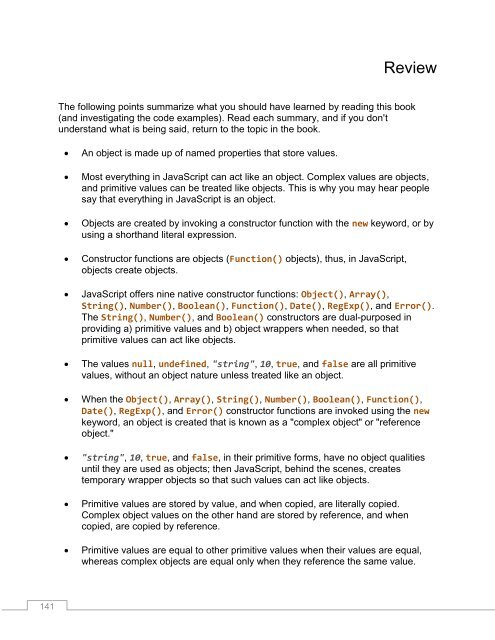JavaScript_Succinctly
You also want an ePaper? Increase the reach of your titles
YUMPU automatically turns print PDFs into web optimized ePapers that Google loves.
Review<br />
The following points summarize what you should have learned by reading this book<br />
(and investigating the code examples). Read each summary, and if you don't<br />
understand what is being said, return to the topic in the book.<br />
<br />
<br />
<br />
<br />
<br />
<br />
<br />
<br />
<br />
<br />
An object is made up of named properties that store values.<br />
Most everything in <strong>JavaScript</strong> can act like an object. Complex values are objects,<br />
and primitive values can be treated like objects. This is why you may hear people<br />
say that everything in <strong>JavaScript</strong> is an object.<br />
Objects are created by invoking a constructor function with the new keyword, or by<br />
using a shorthand literal expression.<br />
Constructor functions are objects (Function() objects), thus, in <strong>JavaScript</strong>,<br />
objects create objects.<br />
<strong>JavaScript</strong> offers nine native constructor functions: Object(), Array(),<br />
String(), Number(), Boolean(), Function(), Date(), RegExp(), and Error().<br />
The String(), Number(), and Boolean() constructors are dual-purposed in<br />
providing a) primitive values and b) object wrappers when needed, so that<br />
primitive values can act like objects.<br />
The values null, undefined, "string", 10, true, and false are all primitive<br />
values, without an object nature unless treated like an object.<br />
When the Object(), Array(), String(), Number(), Boolean(), Function(),<br />
Date(), RegExp(), and Error() constructor functions are invoked using the new<br />
keyword, an object is created that is known as a "complex object" or "reference<br />
object."<br />
"string", 10, true, and false, in their primitive forms, have no object qualities<br />
until they are used as objects; then <strong>JavaScript</strong>, behind the scenes, creates<br />
temporary wrapper objects so that such values can act like objects.<br />
Primitive values are stored by value, and when copied, are literally copied.<br />
Complex object values on the other hand are stored by reference, and when<br />
copied, are copied by reference.<br />
Primitive values are equal to other primitive values when their values are equal,<br />
whereas complex objects are equal only when they reference the same value.<br />
141



